
International Journal on Software Tools for Technology Transfer
Scope & Guideline
Innovating the Future of Software Tools in Technology Transfer
Introduction
Aims and Scopes
- Software Verification and Validation:
The journal consistently publishes research on methodologies and tools for verifying and validating software systems, ensuring their correctness and reliability, especially in critical applications. - Formal Methods:
A core focus of the journal is on formal methods, which provide mathematically rigorous techniques for specifying, developing, and verifying software and systems. - Tool Development for Software Analysis:
The publication emphasizes the development and application of software tools that support various aspects of software analysis, including static analysis, model checking, and runtime verification. - Application in Critical Systems:
Research often highlights applications of software tools and formal methods in critical systems, such as automotive, aerospace, and industrial automation, where safety and reliability are paramount. - Interdisciplinary Approaches:
The journal encourages interdisciplinary research that integrates concepts from computer science, engineering, and other fields to enhance software tools and technology transfer.
Trending and Emerging
- Blockchain and Smart Contracts:
Recent publications highlight a growing interest in the verification and analysis of blockchain technologies and smart contracts, emphasizing the need for robust security measures in decentralized applications. - Machine Learning and AI in Software Engineering:
The integration of machine learning and artificial intelligence techniques into software engineering practices is trending, with research exploring their applications in automated verification and performance optimization. - Cyber-Physical Systems (CPS):
There is an increasing focus on cyber-physical systems, particularly in terms of modeling, verification, and monitoring, reflecting the rise of IoT and interconnected systems in various industries. - Runtime Verification:
The theme of runtime verification is emerging strongly, with significant research dedicated to the monitoring of software systems during execution to ensure compliance with specifications and detect anomalies. - Adaptation and Resilience in Software Systems:
Emerging studies are focusing on the adaptability and resilience of software systems, particularly in dynamic environments, indicating a shift towards more robust software engineering practices.
Declining or Waning
- Traditional Static Analysis Techniques:
There has been a noticeable decrease in publications focusing solely on traditional static analysis methods, as newer, more advanced techniques and hybrid approaches gain traction. - General Software Testing Methodologies:
Research on general software testing methodologies appears to be waning as more specific and specialized testing techniques, such as those tailored for particular domains or technologies, become more prevalent. - Legacy Systems and Maintenance:
The focus on legacy systems and their maintenance strategies has declined, potentially due to the industry's shift towards cloud-native applications and modern software architectures.
Similar Journals
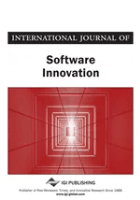
International Journal of Software Innovation
Driving Change Through Software Research and Collaboration.The International Journal of Software Innovation, published by IGI Global, serves as a crucial platform for disseminating cutting-edge research in the field of software engineering and innovation. With its ISSN 2166-7160 and E-ISSN 2166-7179, this journal has a broad scope that encompasses multiple areas of computer science, including Artificial Intelligence, Computer Graphics and Computer-Aided Design, Computer Networks and Communications, Software, and Computer Science Applications. Since its inception in 2017 and continuing until 2024, the journal has established itself in Q4 quartiles across various categories, reflecting both emerging trends and foundational principles in software innovation. Although it does not currently follow an Open Access model, its findings are vital for researchers, professionals, and students aiming to understand and contribute to the evolving landscape of software technologies. Located in the United States at 701 E Chocolate Ave, Ste 200, Hershey, PA 17033-1240, this journal not only offers research insight but also encourages collaboration and knowledge sharing among scholars worldwide.
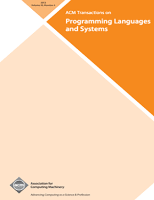
ACM TRANSACTIONS ON PROGRAMMING LANGUAGES AND SYSTEMS
Advancing the Frontiers of Programming Languages and SystemsACM Transactions on Programming Languages and Systems (ISSN: 0164-0925, E-ISSN: 1558-4593) is a prestigious journal published by the Association for Computing Machinery, focusing on advancing the field of programming languages and systems. Established in 1979, this enduring publication has become a significant resource for researchers and practitioners alike, with a convergence extending to 2024. The journal maintains a strong presence in the academic community, currently placed in the Q2 category for Software in 2023, demonstrating its commitment to high-quality research. With a Scopus ranking of #260 out of 407 in Computer Science Software, it highlights a unique niche that bridges theoretical foundations and practical implementations. Although it does not offer open access, the journal ensures quality dissemination of tools, methodologies, and innovations that cater to both seasoned professionals and emerging scholars. The ACM Transactions on Programming Languages and Systems thus plays a crucial role in shaping the future of programming languages and their applications, making it an essential read for anyone vested in the field.

Software Impacts
Unlocking the Potential of Software Impact WorldwideSoftware Impacts is an esteemed academic journal published by ELSEVIER, dedicated to advancing the field of software science and informing best practices in development and application. With an ISSN of 2665-9638, this journal facilitates the dissemination of impactful research from 2019 to 2024, making it a valuable resource for both established researchers and promising students alike. Although it currently holds a Q3 ranking in the category of Software and ranks at #270/407 in Scopus, it continues to contribute significantly to the discourse surrounding software-related innovations and methodologies. The journal’s open access policy enhances accessibility and encourages a broader readership, fostering an environment where critical discussions flourish. By addressing the ongoing challenges and advancements in software technology, Software Impacts plays a crucial role in shaping the future of software development and its applications globally.

SOFTWARE QUALITY JOURNAL
Elevating standards in software quality assurance.SOFTWARE QUALITY JOURNAL, published by Springer, is a preeminent platform dedicated to advancing the field of software engineering and quality assurance. With an ISSN of 0963-9314 and an E-ISSN of 1573-1367, this journal serves as a vital resource for academics and practitioners alike, bridging the gap between theoretical frameworks and practical applications. The journal is recognized for its impactful contributions, holding a remarkable Q1 ranking in Media Technology and demonstrating strong performance with Q2 placements in Safety, Risk, Reliability and Quality, as well as Software, solidifying its reputation in the academic community. As of 2023, the journal is ranked 64th in Safety, Risk, Reliability and Quality and 176th in Computer Science Software on Scopus, showcasing its relevance and influence. Covering a broad range of topics from software quality metrics to risk management strategies, SOFTWARE QUALITY JOURNAL aims to foster innovation and best practices in software development. Join a community of leading researchers and professionals committed to enhancing the quality and reliability of software systems.

Software and Systems Modeling
Pioneering Insights in Software and SystemsSoftware and Systems Modeling is a premier journal published by Springer Heidelberg, dedicated to advancing the fields of software engineering, modeling, and systematic design. With an ISSN of 1619-1366 and an E-ISSN of 1619-1374, this journal has established itself as a critical resource for researchers and practitioners alike since its inception in 2005. The journal currently holds a Q1 quartile ranking in the Modeling and Simulation category and a Q2 ranking in Software, reflecting its influential contributions to the field. Its Scopus rankings further underscore its relevance, positioned at #55 in Modeling and Simulation and #139 in Software, with impressive percentiles of 83rd and 65th respectively. Although it does not currently offer open access, it remains an essential platform for disseminating innovative research and fostering dialogue among professionals in Germany and beyond. The journal’s objective is to publish high-quality articles that contribute to the understanding and development of software and systems modeling, ensuring ongoing advancements in this dynamic arena.

Automated Software Engineering
Empowering Software Engineering with Cutting-Edge InsightsAutomated Software Engineering is a premier journal dedicated to advancing the field of software engineering through the exploration of innovative methodologies, tools, and applications. Published by Springer since its inception in 1994, this journal has established itself as a vital resource for researchers, industry professionals, and students alike, providing insights into the latest trends and technological advancements. With an impressive impact factor and currently ranked in the Q2 quartile of the Software category, it is recognized for its contribution to the discipline. The journal covers a broad scope of topics including automation in software development, empirical studies, and theoretical advancements, fostering discussions that bridge academia and industry. As we look forward to converging towards the year 2024, the journal continues to invite high-quality submissions that challenge existing paradigms and pave the way for future innovations in software engineering.
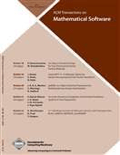
ACM TRANSACTIONS ON MATHEMATICAL SOFTWARE
Transforming mathematical research with innovative software applications.Welcome to the ACM Transactions on Mathematical Software, a prestigious journal published by the Association for Computing Machinery (ACM). With an ISSN of 0098-3500 and an E-ISSN of 1557-7295, this journal has been at the forefront of innovation in the field since its inception in 1975. It serves as a critical platform for researchers, professionals, and students, facilitating the dissemination of advanced mathematical techniques and software developments. The journal is recognized for its outstanding impact, evidenced by its Q1 classification in Applied Mathematics and Q2 in Software for 2023, along with an impressive Scopus ranking placing it in the 85th percentile for Applied Mathematics and the 58th percentile for Computer Science. Our objective is to publish high-quality research that explores new methodologies in mathematical software and their applications, driving the field forward. Although not an open access journal, the relevance and rigor of the content ensure that it remains a valuable resource in mathematical and computational sciences. Join us in exploring the latest in mathematical software and contribute to shaping future advancements.
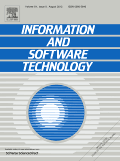
INFORMATION AND SOFTWARE TECHNOLOGY
Leading the Way in Software and Information Technology InsightsINFORMATION AND SOFTWARE TECHNOLOGY, published by Elsevier, is a leading journal that stands at the forefront of the fields of software engineering, information systems, and computer science applications. Since its inception in 1970 and with a focus extending to 2025, this esteemed publication has made significant contributions to the discourse on technological advancements and innovations. In 2023, it has achieved a remarkable Q1 categorization across multiple domains, including Computer Science Applications, Information Systems, and Software, reflecting its excellence and relevance in the academic community. With Scopus rankings that place it in the top percentiles in its categories (85th, 83rd, and 83rd respectively), the journal serves as an essential platform for researchers, professionals, and students eager to disseminate and engage with cutting-edge research and developments. While it does not currently offer Open Access options, the knowledge curated within its pages remains invaluable for advancing the fields of information technology and software development.
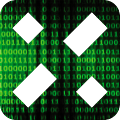
SoftwareX
Connecting Researchers to Transform Software PracticesSoftwareX is an innovative open-access journal published by Elsevier that has been championing advancements in the fields of Computer Science and Software since its inception in 2015. With a focus on presenting high-quality research, SoftwareX aims to foster collaboration and knowledge exchange among researchers and practitioners, advancing the way software and tools are developed and disseminated within the community. This journal operates under a flexible access model, allowing broad visibility and accessibility to its diverse readership. Positioned in the Q2 and Q3 quartiles of the Scopus ranking system within the domains of Computer Science Applications and Software respectively, SoftwareX stands as an influential platform for sharing cutting-edge methodologies and innovations. The journal's aim is not only to serve as a repository of knowledge but also to embolden practitioners and scholars alike to engage with and implement findings that can accelerate progress within the realms of software engineering and application. Situated in Amsterdam, Netherlands, SoftwareX has embraced an international reach, welcoming submissions that address complex challenges through novel software solutions.

PROGRAMMING AND COMPUTER SOFTWARE
Fostering a Deeper Understanding of Software ComplexitiesPROGRAMMING AND COMPUTER SOFTWARE is a distinguished journal committed to advancing the field of software development and programming methodologies. Published by PLEIADES PUBLISHING INC, this journal has been a valuable resource since its inception in 1978, reaching out to researchers, professionals, and students alike. With an emphasis on rigorous peer-reviewed articles, the journal holds a Q3 ranking in the realm of Software according to the latest 2023 Category Quartiles. Though it does not offer open access, the journal ensures that high-quality research is disseminated to its audience, providing insights into evolving programming techniques, software engineering challenges, and innovative solutions. With its convergence of years extending to 2024, PROGRAMMING AND COMPUTER SOFTWARE remains a pivotal publication, fostering a deeper understanding of the complexities in computer programming while supporting the broader software community.